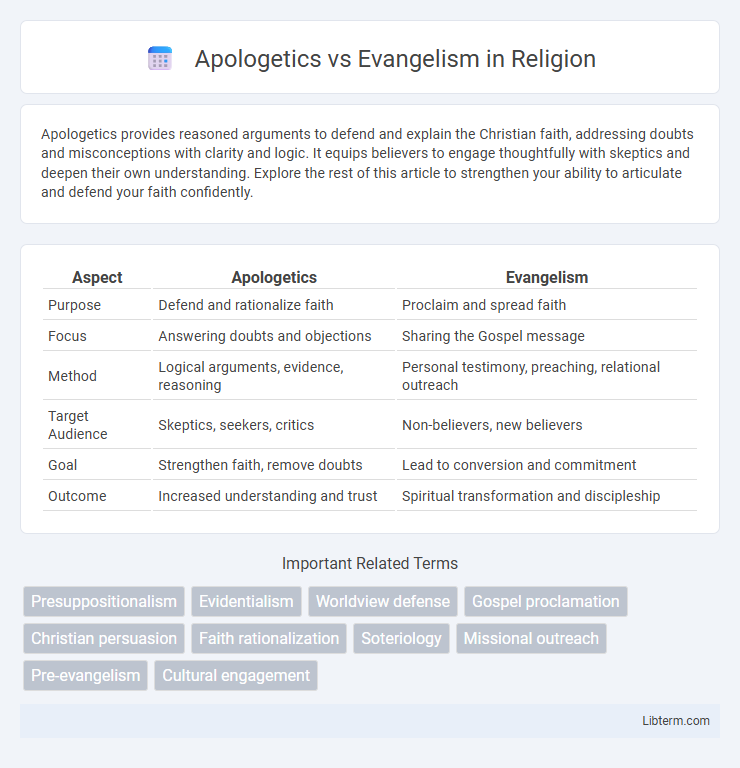Apologetics provides reasoned arguments to defend and explain the Christian faith, addressing doubts and misconceptions with clarity and logic. It equips believers to engage thoughtfully with skeptics and deepen their own understanding. Explore the rest of this article to strengthen your ability to articulate and defend your faith confidently.
Table of Comparison
| Aspect | Apologetics | Evangelism |
|---|---|---|
| Purpose | Defend and rationalize faith | Proclaim and spread faith |
| Focus | Answering doubts and objections | Sharing the Gospel message |
| Method | Logical arguments, evidence, reasoning | Personal testimony, preaching, relational outreach |
| Target Audience | Skeptics, seekers, critics | Non-believers, new believers |
| Goal | Strengthen faith, remove doubts | Lead to conversion and commitment |
| Outcome | Increased understanding and trust | Spiritual transformation and discipleship |
Understanding Apologetics: Definition and Purpose
Apologetics involves the reasoned defense of the Christian faith, aiming to provide rational explanations and evidence that support its truth claims. Its purpose is to address doubts, answer objections, and clarify misconceptions, thereby strengthening believers' faith and engaging skeptics intellectually. Unlike evangelism, which primarily focuses on sharing the gospel message to encourage faith, apologetics seeks to establish a foundation of credibility and understanding.
Defining Evangelism: Goals and Methods
Evangelism aims to share the Christian gospel, focusing on converting individuals by communicating the message of Jesus Christ's life, death, and resurrection. Methods include personal testimony, preaching, relational conversations, and public outreach events designed to engage diverse audiences. The primary goal is to inspire faith and encourage a commitment to Christian beliefs and practices.
Historical Development of Apologetics and Evangelism
The historical development of apologetics traces back to early Christian thinkers like Justin Martyr and Tertullian, who defended the faith against pagan critics in the 2nd and 3rd centuries. Evangelism evolved through the Great Commission in the New Testament, gaining momentum during the Apostolic Age and expanding significantly during the Protestant Reformation with figures such as Martin Luther and John Wesley emphasizing personal faith and outreach. Both fields have continued to develop in response to cultural and philosophical challenges, shaping contemporary Christian ministry strategies.
Core Differences Between Apologetics and Evangelism
Apologetics centers on providing reasoned arguments and evidence to defend and explain Christian beliefs, aiming to address doubts and intellectual objections. Evangelism focuses on sharing the gospel message to inspire faith and encourage personal commitment to Jesus Christ. While apologetics engages the mind through rational discourse, evangelism appeals to the heart by inviting a transformative spiritual response.
Complementary Roles in Christian Outreach
Apologetics and evangelism serve complementary roles in Christian outreach by addressing different needs within the faith journey; apologetics provides reasoned defenses and answers to objections, strengthening believers' confidence and engaging skeptics intellectually. Evangelism focuses on sharing the gospel message and inviting individuals into a personal relationship with Christ, often appealing to emotions and personal transformation. Together, these approaches create a balanced strategy that equips Christians to both defend their faith and actively spread it.
Strategies: When to Use Apologetics vs Evangelism
Effective evangelism focuses on sharing the gospel and inviting belief, typically used when individuals show openness to spiritual discussions. Apologetics is best deployed when there are questions, doubts, or challenges about faith, aiming to provide reasoned answers and strengthen understanding. Assessing the audience's receptivity and readiness determines the strategic use of evangelism or apologetics for impactful ministry.
Common Misconceptions About Both Approaches
Apologetics is often misunderstood as merely defending Christianity with intellectual arguments, while evangelism is inaccurately seen only as emotional appeals for conversion. Both share the goal of spreading the Christian faith, but apologetics focuses on addressing doubts and objections through reasoned dialogue, whereas evangelism emphasizes proclaiming the gospel message to inspire belief. Clarifying these roles helps avoid the misconception that one approach substitutes the other, highlighting their complementary nature in Christian outreach.
Biblical Foundations for Apologetics and Evangelism
Biblical foundations for apologetics emphasize defending the faith through reasoned arguments, as seen in 1 Peter 3:15, which urges believers to always be prepared to explain their hope. Evangelism focuses on sharing the gospel message, motivated by the Great Commission in Matthew 28:19-20 to make disciples of all nations. Both practices reflect Christ's mandate to proclaim truth and bring others into a transformative relationship with God through scriptural authority.
Real-World Examples and Case Studies
Apologetics demonstrates its impact through case studies like C.S. Lewis, whose logical defenses of Christianity influenced countless skeptics, while evangelism thrives in real-world examples such as Billy Graham's global crusades, which converted millions through personal testimony and preaching. Cities like Los Angeles have witnessed combined strategies, where apologetics addresses intellectual doubts in university settings and evangelism engages diverse communities through outreach events. These examples highlight how apologetics and evangelism function complementarily, addressing both belief barriers and spiritual needs in practical contexts.
Building a Balanced Ministry Approach
A balanced ministry approach integrates apologetics and evangelism to effectively address both intellectual doubts and spiritual needs. Apologetics equips believers with reasoned defenses of faith, fostering credibility and trust, while evangelism emphasizes personal testimonies and relational outreach to inspire commitment. Combining these strategies strengthens ministry impact by nurturing informed faith and actively sharing the gospel.
Apologetics Infographic

 libterm.com
libterm.com